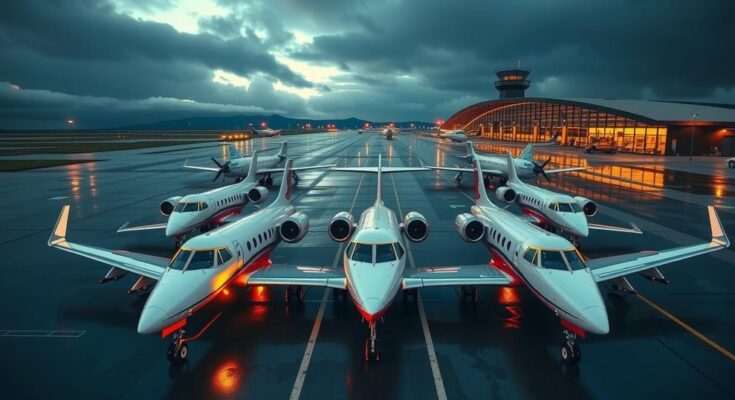Climate scientists warn that the ultra-rich are using private jets like taxis, leading to a 46% increase in carbon emissions since 2019. Research indicates that flying privately can emit more carbon dioxide in one hour than an average person produces in a year. The study emphasizes the environmental impact of this behavior, particularly as private flights accounted for 15.6 million tonnes of emissions in 2023. Increasing demands for private travel, often for leisure, reinforce the urgent need for sustainable aviation practices amid rising global temperatures.
Recent research reveals that the ultra-rich are utilizing private jets with alarming frequency, leading to a notable rise in carbon dioxide emissions. Climate scientists have documented a striking 46% increase in emissions from private flights between 2019 and 2023, attributing it to heightened demand, particularly following restrictions on commercial travel during the COVID-19 pandemic. The study indicates that flying in a private jet emits more carbon dioxide in just one hour than the average person produces over an entire year. The research team monitored global private flight patterns, including trips to popular locations like Ibiza and significant events such as the FIFA World Cup and the UN climate conference in Dubai. Findings suggest that private jet travel, often undertaken for leisure or convenience by members of the wealthiest demographic, has a disproportionately large environmental impact. In 2023 alone, private jet flights produced an estimated 15.6 million tonnes of carbon dioxide, equating to the annual emissions of approximately 3.7 million cars. While this figure constitutes merely 1.8% of the cumulative emissions from all aviation, the implications are significant when considering the concentrated emissions from a small population segment categorized as ultra-high-net-worth individuals, which totals around 256,000 globally. The study highlights the disproportionate carbon footprint of these individuals, asserting that their travel habits reflect a detachment from global environmental standards. The research further reveals that nearly half of these flights traveled less than 500 kilometers, prompting concerns about the environmental consequences of short-distance air travel. Notably, the flights associated with high-profile events produced thousands of tonnes of emissions, emphasizing the need for urgent discussions surrounding sustainable alternatives in the aviation sector. This predicament has raised critical questions regarding the aviation industry’s future, particularly as emissions from commercial air travel are projected to more than double by 2050. Currently, while the International Air Transport Association commits to achieving net-zero emissions by 2050, many scientists remain skeptical about the industry’s capability to transition to sustainable fuels without further exacerbating global warming. Understanding the influence of the ultra-rich on carbon emissions through their frequent private jet travel may be pivotal in shaping future climate policies and public consciousness around responsible travel choices.
The surrounding context of this study involves the growing concern over climate change and the impact of various industries on global carbon emissions. The aviation sector stands out as a significant contributor, accounting for approximately 4% of total global emissions. Within this sector, private jet usage is often criticized for its disproportionate environmental impact, especially as the wealthiest individuals tend to travel without regard for the carbon footprint associated with their flights. The onset of the COVID-19 pandemic altered travel patterns, increasing demand for private flights as commercial options became limited. The research draws attention to the urgent need for dialogue and action regarding sustainability within air travel, particularly among the most affluent.
In conclusion, the research illustrates the pressing issue of increasing carbon emissions from private jets favored by the ultra-rich. The findings indicate a profound environmental impact stemming from leisure travel and short-distance flights, underscoring the need for a collective reassessment of travel habits, especially among affluent populations. With alarming projections for future aviation emissions, stakeholders in the industry and policy makers must prioritize sustainable practices and technologies to curb the adverse effects of air travel on climate change. As climate scientists advocate for immediate action, society must recognize its role in fostering environmentally responsible behaviors across all demographics.
Original Source: www.bbc.com




